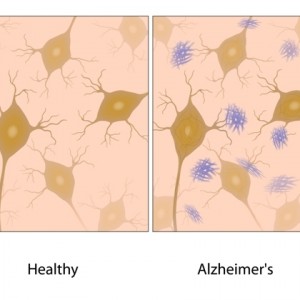BACE1 Inhibitors in Phase 3 Trials for Alzheimer’s are Safe in Moderate Doses, According to Study

 Decreasing aggregates of amyloid beta peptide (Aβ) is the most common strategy for treating Alzheimer’s disease. One treatment that is undergoing phase 3 clinical trials is beta site amyloid precursor protein cleaving enzyme 1 (BACE1) inhibitors, which are predicted to decrease the production of Aβ and prevent neurotoxic fibril and plaque formation. A research group in Germany is studying BACE1 inhibitors in mice to further understand how this treatment works.
Decreasing aggregates of amyloid beta peptide (Aβ) is the most common strategy for treating Alzheimer’s disease. One treatment that is undergoing phase 3 clinical trials is beta site amyloid precursor protein cleaving enzyme 1 (BACE1) inhibitors, which are predicted to decrease the production of Aβ and prevent neurotoxic fibril and plaque formation. A research group in Germany is studying BACE1 inhibitors in mice to further understand how this treatment works.
“BACE1 (beta site amyloid precursor protein cleaving enzyme 1) is the rate limiting protease in amyloid β production, hence a promising drug target for the treatment of Alzheimer’s disease,” explained Dr. Jochen Herms in the team’s article, “Pharmacological Inhibition of BACE1 Impairs Synaptic Plasticity and Cognitive Functions,” published in the current article of Biological Psychiatry. However, like many treatments for Alzheimer’s disease, BACE1 inhibitors have the potential for side-effects. “Since several BACE1 inhibitors are currently being evaluated in clinical phase 3 trials for the treatment of Alzheimer’s disease, the identification of potential side effects will be of great importance to ensure a positive clinical outcome,” said Dr. Herms, in a news report.
The team at Ludwig-Maximillians-University Munich tested BACE1 inhibition in mice by administering one of two BACE1 inhibitors, SCH1682496 or LY2811376, orally and then measuring effects of the drug, both adverse and beneficial. BACE1 inhibition was correlated to decreased levels of amyloid beta 40 (Aβ40), but the benefits were outweighed by adverse effects at higher doses. “Our study demonstrates that moderate inhibition of BACE1 might be therapeutically efficient without any overt signs of health impairments,” said Dr. Herms. “On the contrary, we found that strong inhibition of BACE1 in mice causes structural and functional synaptic alterations with deterioration of cognitive performance.”
Although these studies show promise for Alzheimer’s disease treatment, they were conducted in mice, and a drug dose in a mouse has different implications in a human. Phase 3 clinical trials in human patients with Alzheimer’s disease are ongoing and will give a better indication of the safety of BACE1 inhibitors. “Alzheimer’s disease presents such a terrible burden on individuals, families, and society that if BACE1 inhibitors produce beneficial effects on the course of this disorder, it is well worth the effort to try to understand and circumvent this new risk,” said Dr. John Krystal, editor of Biological Psychiatry, indicating the importance of this new treatment.






